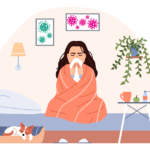Assistant Professor Natasha Yates answers some common patient questions.
With much of the pandemic up to this point focussed on how to avoid catching covid, advice on how to manage the virus when it actually presents has barely had a look in.
Dr Natasha Yates, Assistant Professor of General Practice at Bond University, spoke to The Medical Republic about some of the resources available to GPs finding themselves inundated with calls from covid-positive patients.
This conversation, recorded for our podcast The Tea Room, has been edited for length and clarity.
The Medical Republic: A frequent question I’m hearing from our readers is ‘when can GPs escalate care?’ and ‘how sick is too sick?’ How have you dealt with that?
Dr Natasha Yates: The big thing that we’re all struggling with a little bit right now is the massive 180 that we’ve had to do as GPs about what covid means to us.
Despite all our best plans, we are just not able to physically see and look after every single person who catches covid. That’s been a really big mindshift for me as a GP, but also for the community, who have been well trained to recognise that covid is not just a common cold.
Now that we’re trying to deal with large numbers of people who have covid, we need to look at what we can physically do without burning ourselves out.
TMR: Which specific patients should GPs be keeping an eye on?
NY: As a general rule, we do want higher risk patients to be able to access additional supports at the very least, and perhaps some interventions [like intravenous treatments].
There are some quite clear parameters around who can access monoclonal antibodies – people who are over 65 years of age or have Indigenous heritage and are more than 50 years of age, people who are pregnant and people who are immunocompromised, e.g. actively getting cancer treatment or on medications that suppress their immune system.
People who are unvaccinated fall under this category as well.
Then there are the diseases or comorbidities that we as GPs already know put our patients at high risk, things like liver disease, kidney disease, heart disease, diabetes and obesity.
For patients who fall under those categories, most health pathways will have clear guidance that they should be at least escalated.
TMR: Anecdotally, there’s been advice floating around here and there for patients to stock up on paracetamol and ibuprofen. How sound is that advice, and what can GPs do when patients call up with mild symptoms but heightened anxiety?
NY: Panadol and Nurofen are absolutely fine and safe to take, but only if you need them. They’re not going to affect the course of the disease, but they can make you feel a bit better.
There are a few other things that are really handy to have if possible, like pulse oximeters.
One of the key parameters we can use when we were talking with people in their homes about how unwell they are is what their oxygen saturations are. So if they can check that on a home oxygen monitor that gives us an objective measure.
We all know that people can feel breathless because they’re anxious or panicky, but if their sats are low, then we know that’s from the underlying pathophysiology.
I should just say here, a lot of our patients do have smartwatches and they will ask ‘well, can I use my smart watch?’ to measure blood oxygen. Unfortunately, the research has quite clearly shown that it’s not sensitive enough to do that.
TMR: What else can GPs do to prepare?
NY: I think we need to become familiar with the resources that are out there, because that’s what we can point patients to.
The Healthdirect website is the federal resource. Then there’s some great resources put out on the GPs-Can website and the RACGP has quite a thorough and long document.







